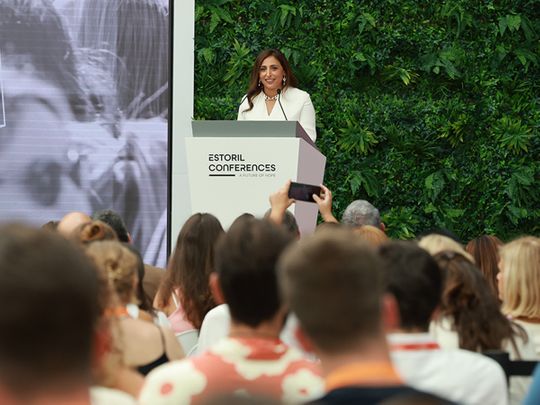
Lisbon: Cultural diversity and representation in publishing were the focus of an empowering speech by Bodour Al Qasimi, President of the International Publishers Association (IPA) at the 7th edition of the Estoril Conference, recently held in Lisbon.
Held over two days, the Estoril Conference is a platform to promote an open and inter-generational dialogue with the aim of developing a more inclusive and sustainable future. In order to create effective change, the conference brings together global citizens inspiring the co-creation of effective and solution-driven coalitions.
In her address to delegates, Bodour made a poignant speech using case studies as well as her own experiences as an Arab, Muslim woman in publishing to underscore the vital role that representation plays in creating a mirror for humanity – the theme of the conference session.
Diversity and gender equality have long been spoken of within the publishing sector, but Bodour explained that it is a subject which requires vigilance and constant attention from the wider industry in order to achieve success for all stakeholders.
Preventing marginalisation
As an example, the IPA President used the case of acclaimed American poet Yi-Fen Chou whose inclusion in the 2015 American Poetry Anthology caused an uproar when it was discovered that she was in fact a Caucasian male poet by the name of Michael Hudson – whose submission was repeatedly rejected until he adopted a nom de plume from a different culture, and gender than his own.
Bodour went on to explain that the debate as to whether the poem was accepted on merit, or whether prejudice, gender and race played a part in its publication is a prime example of the reflection and discourse that the publishing community must undertake in order to enact positive change within the industry – change which will prevent the institutional marginalisation of authors and publishers from all backgrounds. She added that as a result of these challenging conversations, readers will have a greater opportunity to access content which best reflects the world around them.
Personal reflections
Using her personal reflections to further underscore her message, Bodour went on to share her own struggles with prejudice and discrimination based on her ethnicity, nationality, religion and gender.
Bodour explained that in the last decade she has strived to empower women from all backgrounds and support their right to achieve the highest professional success. She also said the challenges she has faced as she developed her career had been great. But despite wanting to give up sometimes, Bodour credited her determination and patience in facing down discrimination for her personal success, as playing a key part in her journey to becoming President of the IPA - only the second woman to do so in its 126 years.
Her speech then turned to human values and why it can be so difficult for people to accept different points of view. Bodour explained that the challenge we all have as a society is to face down ignorance with respect and tolerance, find the patience to learn from one another, and make the intentional effort to understand and accept diverse perspectives with loving hearts. Quoting a passage from the Quran (Chapter 30, Verse 22), she added that through creation we are all equal, and yet different:
“And among His wonders is the creation of the heavens and the earth, and the diversity of your tongues and colours. For in this, behold, there are messages indeed for all who are possessed of innate knowledge!”
Bodour added that we can thrive in the spirit of love, patience and unity with publishing playing a vital role in creating an environment where diverse voices can be encouraged, and providing a unique platform where different perspectives can be celebrated.
Finally, the IPA President spoke to the audience as readers, and celebrated their role in shaping the cultural landscape as consumers of content. She challenged them to pick up a book by an author whose work they wouldn’t normally read – to hear a new voice and perhaps gain a new perspective themselves.










